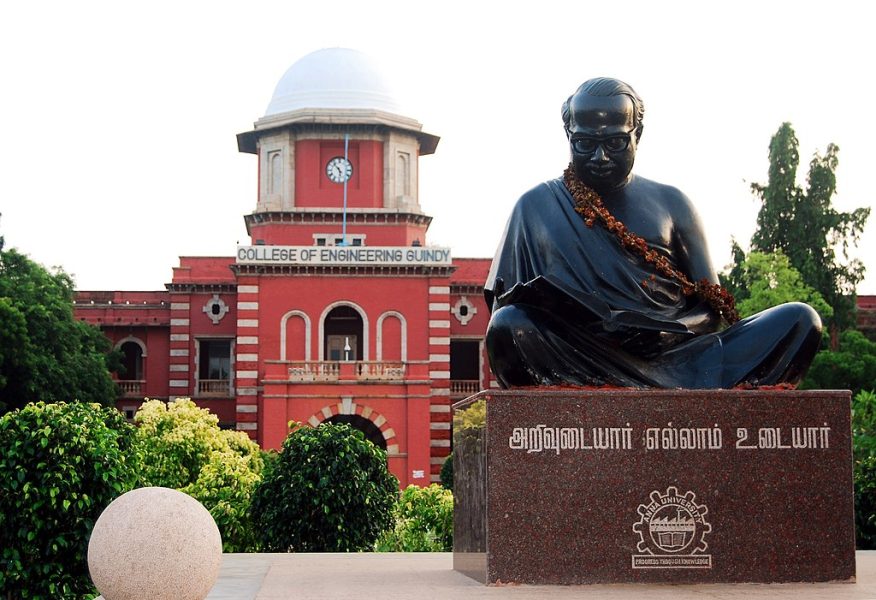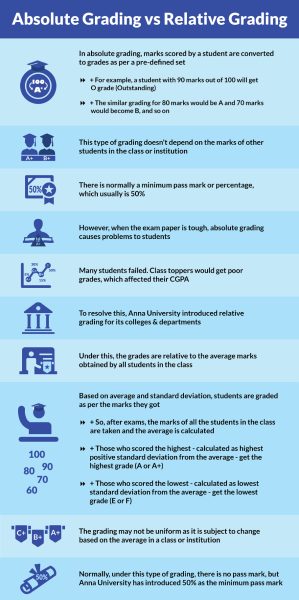
The problem with Anna University’s decision to expand ‘relative grading’

The apex institution for engineering courses in Tamil Nadu, Anna University, plans to expand its ‘relative grading’ system to affiliated colleges starting this academic year. While the students have welcomed the move, the challenges in implementing the system are making teachers wary.
Until 2015, the students of Anna University were evaluated and awarded grades on the basis of an ‘absolute grading’ system. Under that system, the individual score of a student in a paper was taken for consideration for grading.
From 2015, the university department students studying in four of the varsity colleges – College of Engineering, Guindy, Madras Institute of Technology, Chromepet, Alagappa College of Technology, Guindy, and School of Architecture and Planning, Guindy – started to be awarded on a relative grading basis. In the relative grading system, the individual’s score is compared with the class average and grades are awarded accordingly.
Also read: Govt’s overseas scholarship bars research on caste, gender inequality
Unlike absolute grading, the new system doesn’t have a minimum pass mark. Only in 2017, did the university bring in a 50 per cent minimum pass mark.
A Blow to Studious Students
“Relative grading is fine for students studying in Anna University campus because there the class strength is low. Also, even a socially backward student’s cutoff mark would be high. So evaluating and grading can be done without any difficulty. But when it is expanded to all the affiliated colleges, about one lakh students will write the exams. Grading them on the relative grading basis becomes challenging when there is such a large number of students,” said an official, who is a controller of examinations of a private engineering college in Madurai, on condition of anonymity.

To make it clear, consider this example. Suppose there are 50 students in a class, if 20 students scored more than 90 marks in a paper, on the basis of absolute grading they would be awarded ‘O’ grade. But under the relative grading system, even if 40 students score more than 90 marks, all of those 40 students would not get ‘O’ grade. Because the system will grade the students who scored marks between 100 and 90. On the other hand, if there is a minimum pass mark of 50 and if a student scores 40 marks, even then he or she would be declared as pass because of the median and standard deviation. So while studious students are deprived of good grades, a below average student gains.
“The relative grading system can be useful only when there is a normal curve, meaning when the sample size is less and the quality of the students is more or less equally same. But when it is extended to affiliated colleges, all the one lakh students will write exams for the same set of questions and it will affect the grading because here all the students have different levels of quality. Also, the university cannot do grading separately for each college on a relative basis. How these loopholes are going to be addressed is not clear yet,” he said.
Companies Reluctant to Accept Relative Grading
Dr S Chandramohan, professor, department of electrical and electronics engineering, Anna University, said that having a minimum pass mark is against the concept of relative grading.
“In relative grading you just compare the marks of one student with the others. Under this concept there should not be any minimum pass mark. It defies the whole concept. But in our experience, we see students have an understanding among themselves and the studious students don’t read difficult portions of the syllabus and they even don’t attempt some of the questions during the exams. This makes the studious students get 60 marks out of 100, and the poor students even if they get just 10 marks, they are announced as passing the subject. On the other hand, the studious students get good grades. In order to prevent such malpractices, the university has brought 50 per cent of minimum pass mark,” he said.
Also read: Tamil publishing industry is thriving. Chennai Book Fair is major part of the reason
But the problem does not end there. After the introduction of minimum pass marks under the relative grading system, the students who didn’t meet the minimum standards were asked to redo the whole subject or the semester.
“In colleges, asking the students to redo the subject by attending the classes along with their juniors is practically impossible. If not, then we have to conduct separate classes for just four or five students,” said Chandramohan.
He also added that during the campus interviews, the companies are asking for equivalent marks for CGPA. They demand the university to convert the grades into percentages.
“The relative grading categorises the students based on the grades. For example, if student ‘A’ scores 95 marks out of 100, and student ‘B’ scores 90 marks, they both would be included in the ‘O’ grade. But there is a huge difference between 95 and 90, in the mark system. The mark bandwidth should have at least 13 marks difference. You cannot contract or extend that band. When you put this in the chart, the curve should have a bell-shape. These kinds of practical difficulties do exist in this grading system. To be precise, there is no major benefit in this system,” Chandramohan added.
When the syllabus for the university departments and the affiliated colleges are different and also the question papers for the university departments and the affiliated colleges are different, the relative grading system looks good only for the university departments since the students strength is limited. It cannot be suitable for evaluating a large number of students, he said.
‘Debates Still Exist Within the University’
A student named Bhavya, who passed in 2020, said that the relative grading system was done away with in 2020 itself.
“It is true that a section of students are involved in malpractices like leaving out difficult portions of the syllabus, etc. However, for the students who were affected during natural calamities like floods, cyclones, when they were unable to spend time and study, they benefitted from the relative grading system,” she said.
But one of the staff at the university who is closely associated with conducting examinations told The Federal that the relative grading system is still practised in university departments.
“Still there are debates in the university on practising the relative grading system,” the staff said.
Talking to The Federal, Dr M Venkatesan, controller of examinations, Anna University, said that the process of extending the relative grading system to affiliated colleges has just been initiated and there are a lot of issues that need to be addressed.
“We have just completed a preliminary meeting. We have started collecting data from across the colleges. There are some challenges in implementing the system. We will work on those issues in the coming days and we will be able to address them,” he said.


